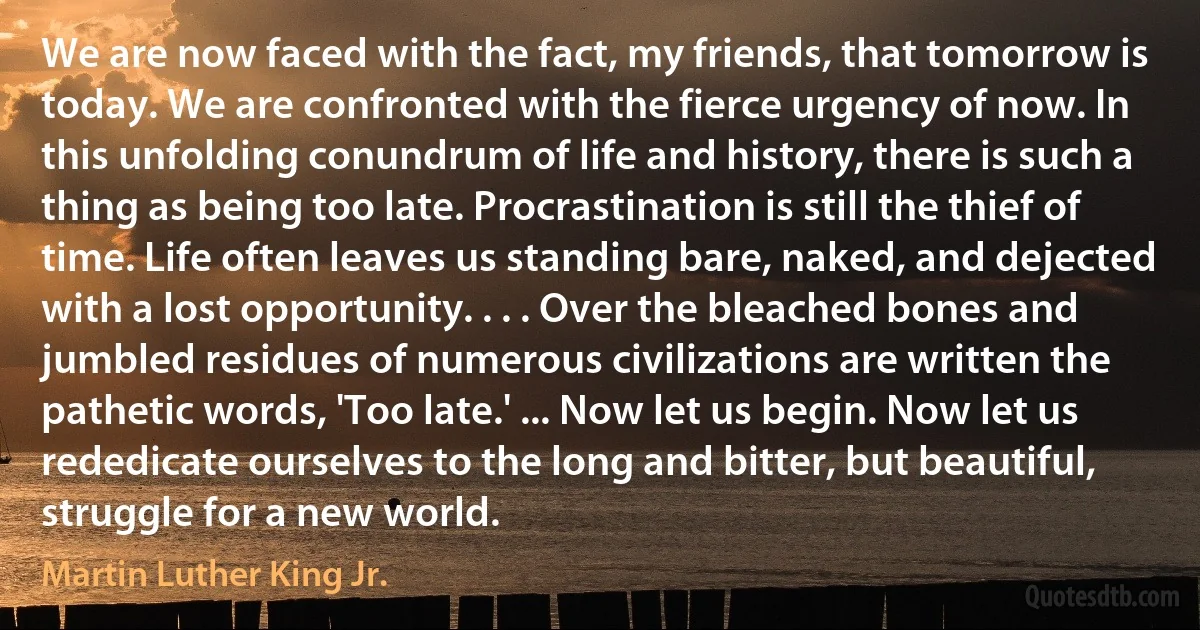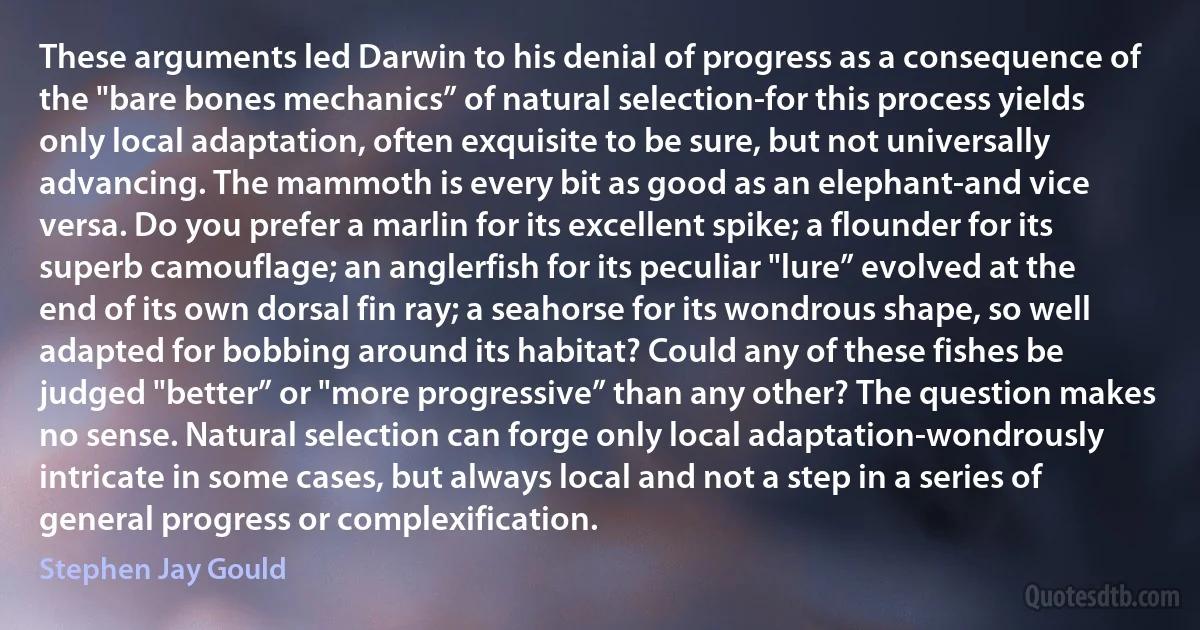Bare Quotes - page 16
From my early youth, since I attained the age of puberty before I was twenty, until the present time when I am over fifty, I have ever recklessly launched out into the midst of these ocean depths, I have ever bravely embarked on this open sea, throwing aside all craven caution; I have poked into every dark recess, I have made an assault on every problem, I have plunged into every abyss, I have scrutinized the creed of every sect, I have tried to lay bare the inmost doctrines of every community. All this have I done that I might 68 distinguish between true and false, between sound tradition and heretical innovation.

Abu Hamid al-Ghazali
I used to look at homeless peopleand try to imagine what they had once looked like. It's not easy. Beneath the grime and degradation is a face once adored by someone. It's a truth that tricks the eye; our glances slide away. But something happened to ruin that life, to strip it bare; and it was something small, something that but for the grace of God could take us, too.

John Hart (author)
I sacrifice my power on the altar of your love
that it may be born again on another world.
Come friend, let us climb the winding flights of stairs
through the narrow door into the chamber bare
a single candle burns as we seat ourselves
words take form in our minds and repeat themselves :
"My beloved and I are one..."

Mike Scott (musician)
Heart, my heart, so battered with misfortune far beyond your strength,
up, and face the men who hate us. Bare your chest to the assault
of the enemy, and fight them off. Stand fast among the beamlike spears.
Give no ground; and if you beat them, do not brag in open show,
nor, if they beat you, run home and lie down on your bed and cry.
Keep some measure in the joy you take in luck, and the degree you
give way to sorrow. All our life is up-and-down like this.
Fragment 67, as translated by R. Lattimore.

Archilochus
Probably end up as one of those sordid cult leaders,” Zefla said after a while as they plodded into a bare area of the forest where a fire had left thousands of tree trunks standing upright and bare, black posts already surrounded by slender young trees forcing their way towards the sky around them. "You know, pedalling some weird concoction of re-tread gibberish and living in a palace while their followers sleep shifts and work the streets and give you this big flatline smile when you tell them where to stuff their tracts.

Iain Banks
Beggars do not work, it is said; but then, what is work? A navvy works by swinging a pick. An accountant works by adding up figures. A beggar works by standing out of doors in all weathers and getting varicose veins, bronchitis etc. It is a trade like any other; quite useless, of course - but, then, many reputable trades are quite useless. And as a social type a beggar compares well with scores of others. He is honest compared with the sellers of most patent medicines, high-minded compared with a Sunday newspaper proprietor, amiable compared with a hire-purchase tout-in short, a parasite, but a fairly harmless parasite. He seldom extracts more than a bare living from the community, and, what should justify him according to our ethical ideas, he pays for it over and over in suffering.

George Orwell
Most observers in the 1870s would have been far more impressed by its linearity. In material terms, in terms of knowledge and the capacity to transform nature it seemed so patent that change meant advance that history – at all events modern history – seemed to equal progress. Progress was measured by the ever rising curve of whatever could be measured, or what men chose to measure. Continuous improvement, even of those things which clearly still required it, was guaranteed by historical experience. It seemed hardly credible that little more than three centuries ago intelligent Europeans had regarded the agriculture, military techniques and even the medicine of the ancient Romans as the model for their own, that a bare two centuries ago there could be a serious debate about whether the moderns could ever surpass the achievement of the ancients, and that at the end of the eighteenth century experts could have doubted whether the population of Britain was increasing.

Eric Hobsbawm
Miss Taggart, do you know the hallmark of the second-rater? It's resentment of another man's achievement. Those touchy mediocrities who sit trembling lest someone's work prove greater than their own-they have no inkling of the loneliness that comes when you reach the top. The loneliness for an equal- for a mind to respect and an achievement to admire. They bare their teeth at you from out of their rat holes, thinking that you take pleasure in letting your brilliance dim them-while you'd give a year of your life to see a flicker of talent anywhere among them. They envy achievement, and their dream of greatness is a world where all men have become their acknowledged inferiors. They don't know that that dream is the infallible proof of mediocrity, because that sort of world is what the man of achievement would not be able to bear.

John Galt
One cannot live through a long stretch of years without forming some philosophy of life. As one journeys along he gains experiences and even some ideas. Accumulated opinions and philosophy may be more important to others than the bare facts about how he lived, so my ambition is not so much to relate the occurrences as to record the ideas that life has forced me to accept; and, after all, thoughts, impressions and feelings are really life itself. I should like to think that these reflections might make existence a trifle easier for some of those who may chance to read this story.

Clarence Darrow
It is not wise warfare to throw your ammunition to the enemy unless you throw it from the cannon's mouth. But if you can compel the enemy to waste his ammunition by drawing his fire on some thoroughly protected spot; if you can, by annoying and goading and harassing him in all possible ways, drive him to the last resort of stripping bare his tyrannous and invasive purposes and put him in the attitude of a designing villain assailing honest men for purposes of plunder; there is no better strategy.

Benjamin Tucker
The history of human thought recalls the swinging of a pendulum which takes centuries to swing. After a long period of slumber comes a moment of awakening. Then thought frees herself from the chains with which those interested - rulers, lawyers, clerics - have carefully enwound her.
She shatters the chains. She subjects to severe criticism all that has been taught her, and lays bare the emptiness of the religious political, legal, and social prejudices amid which she has vegetated. She starts research in new paths, enriches our knowledge with new discoveries, creates new sciences.
But the inveterate enemies of thought - the government, the lawgiver, and the priest - soon recover from their defeat. By degrees they gather together their scattered forces, and remodel their faith and their code of laws to adapt them to the new needs.

Peter Kropotkin
This is believed to be the completest list of this voluminous, prosiack, and driveling monk, that can be formed...in truth, and fact, these stupid and fatigueing productions, which by no means deserve the name of poetry, and their stil more stupid and disgusting author, who disgraces the name and patronage of his master Chaucer, are neither worth collecting (unless it be as typographical curiositys, or on account of the beautyful illuminations in some of his presentation copys), not even worthy of preservation: being only suitablely adapted "ad ficum & piperem," and other more bare and servile uses. How little he profited by the correction, or instructions of his great patron is manifest in almost every part of his elaborate drawlings, in which there are scarcely three lines together of pure and acurate metre.

Joseph Ritson
In the far north, where humans must face the constant threat of starvation, where life is reduced to the bare essentials-it turns out that one of these essentials is art. Art seems to belong to the basic pattern of life of the Eskimo, and of the neighboring Athapaskan and Algonkian Indian bands as well.

Peter Farb
The Harmony of the World is the continuation of the Cosmic Mystery, and the climax of his lifelong obsession. What Kepler attempted here is, simply, to bare the ultimate secret of the universe in an all-embracing synthesis of geometry, music, astrology, astronomy and epistemology. It was the first attempt of this kind since Plato, and it is the last to our day. After Kepler, fragmentation of experience sets in again, science is divorced from religion, religion from art, substance from form, matter from wind.

Johannes Kepler



